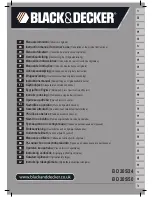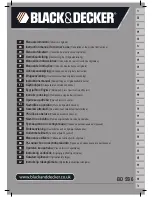
- 4 -
English
SAFETY
IMPORTANT SAFETY INSTRUCTIONS FOR USE OF THE COMPRESSOR
WARNING: Death or serious bodily injury could result from improper or unsafe use of compressor.
To avoid these risks, follow these basic safety instructions:
READ ALL INSTRUCTIONS
1. NEVER TOUCH MOVING PARTS.
Never place your hands, fingers or other body parts near the
compressor’s moving parts. Never insert your fingers or other
objects into the belt guard ventilator. Such an action invites the
danger of injuries.
2. NEVER OPERATE WITHOUT ALL GUARDS IN PLACE.
Never operate this compressor without all guards or safety
features in place and in proper working order. If maintenance or
servicing requires the removal of a guard or safety features, be
sure to replace the guard or safety features before resuming
operation of the compressor.
3. ALWAYS WEAR PROTECTION.
Risk of injury. Always wear ANSI Z87.1 safety glasses with side
shields or equivalent eye protection. Compressed air must
never be aimed at anyone or any part of the body. Use ear
protection as air flow noise is loud when draining.
4. STOP THE ENGINE.
Always stop the engine and pull out the spark plug cap to
prevent any sudden start of the engine and remove the
compressed air from the air tank before servicing, inspecting,
maintaining, cleaning replacing or checking any parts.
5. STORE COMPRESSOR PROPERLY.
When not in use, the compressor should be stored in indoor dry
place. Keep out of reach of children. Lock-out the storage area.
Do not store this compressor near an open flame or any
equipment such as a stove, furnace, water heater, etc. which
utilizes a pilot light or sparking device.
Store flammable materials in a secure location away from
compressor.
6. KEEP WORK AREA CLEAN.
Cluttered areas invite injuries. Clear all work areas of
unnecessary tools, debris, furniture, etc.
7. CONSIDER WORK AREA ENVIRONMENT.
Don’t expose compressor to rain. Don’t use compressor in
damp or wet locations.
Keep work area well lit and well ventilated. Operate this
compressor at a stable place all the time. Risk of fire or
explosion. Do not carry and operate the compressor or any
other electrical device near the spray area. Do not use
compressor in the presence of flammable liquids or gases.
Restricting any of the compressor ventilation openings will
cause serious overheating and could cause fire.
Never place objects against or on top of compressor. Gasoline
engines produce carbon monoxide; a poisonous odorless gas
which may cause death. Do not start or operate this compressor
in an enclosed area. Operate compressor in an open area at
least 4 feet away from any wall or obstruction that would restrict
the flow of fresh air to the ventilation openings.
Compressor produces sparks during operation. Never use
compressor in sites containing lacquer, paint, benzine, thinner,
gasoline, gases, adhesive agents, and other materials which
are combustible or explosive.
This compressor contains some components parts that tend to
produce arcs or sparks, and therefore, when located in a
garage, it should be in a room or enclosure provided for this
purpose, and should be 18 inches (457 mm) or more above the
floor. A spark arrester must be added to the muffler of this
engine if it is to be used on any forest covered, brush covered
or grass covered unimproved land. The arrester must be
maintained in effective working condition by the operator.
In order to avoid damaging this compressor, do not allow the
unit to be tilted more than 10° when operating.
8. KEEP CHILDREN AWAY.
All visitors should be kept safely away from work area.
9. DRESS PROPERLY.
Do not wear loose clothing or jewelry. They can be caught in
moving parts. Wear protective hair covering to contain long hair.
10. MAINTAIN COMPRESSOR WITH CARE.
11. STAY ALERT.
Watch what you are doing. Use common sense. Never stand on
the compressor. Do not operate compressor when you are tired.
Compressor should never be used by you if you are under the
influence of alcohol, drugs or medication that makes you
drowsy.
12. CHECK DAMAGED PARTS AND AIR LEAK.
Before further use of the compressor, a guard or other part is
damaged should be carefully checked to determine that it will
operate properly and perform its intended function. Check for
alignment of moving parts, binding of moving parts, breakage
of parts, mounting, air leak, and any other conditions that may
affect its operation. A guard or other part that is damaged
should be properly repaired or replaced by an authorized
service center unless otherwise indicated elsewhere in this
Instruction Manual.
Have defective engine switch replaced by authorized service
center. Have defective pilot valve replaced by authorized service
center. Do not use compressor if engine switch does not turn it
on and off.
13. NEVER USE COMPRESSOR FOR APPLICATIONS
OTHER THAN THOSE SPECIFIED.
Never use compressor for applications other than those specified
in the Instruction Manual.
Never use compressed air for breathing or respiration.
14. HANDLE COMPRESSOR CORRECTLY.
Operate the compressor according to the instructions provided
herein. Never allow the compressor to be operated by children,
individuals unfamiliar with its operation or unauthorized
personnel.
Carrying the compressor if tilted may result in fuel spillage.
Summary of Contents for EC 2510 E
Page 28: ... 01 23 04 531 3 0 0 6 7 8 396 9 0 ...
Page 29: ... 29 EC 2510 E ...
Page 31: ......
Page 32: ...Revisione 1 4 06 2006 Cod 9100710110 505 Code No C99142461 Printed in China ...





































